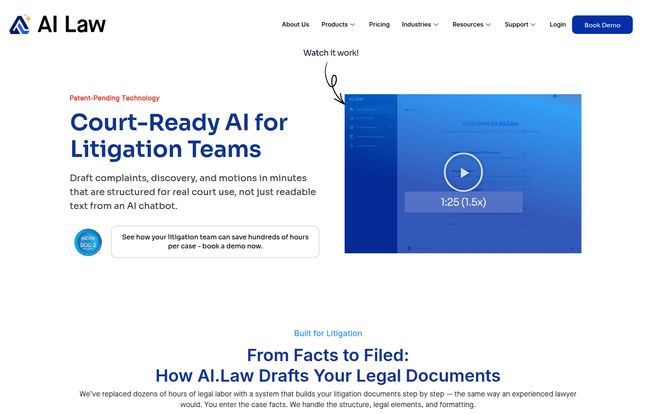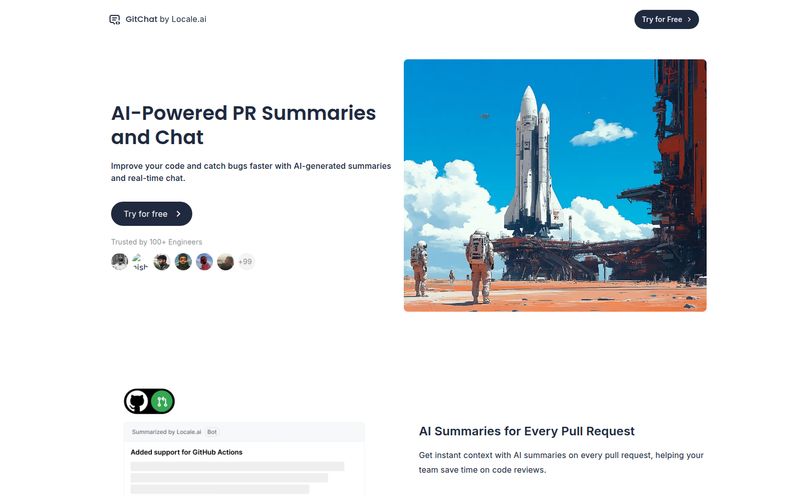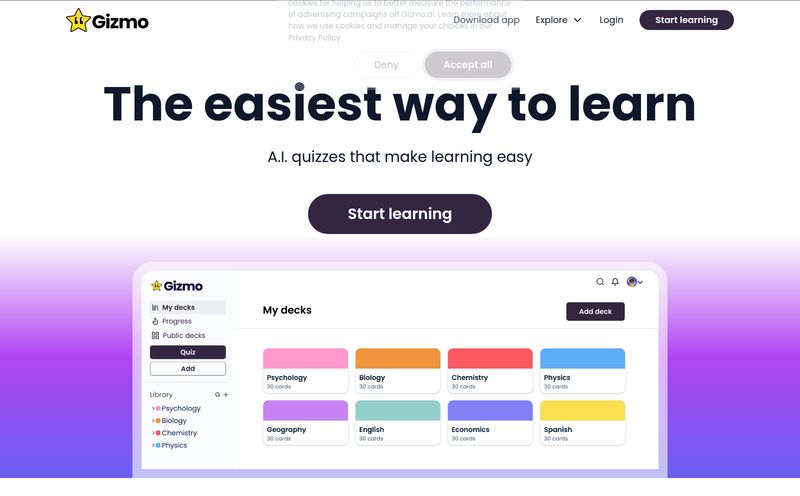There’s a side of legal work that isn’t exactly glamorous. It’s the side filled with papercuts, the smell of stale coffee, and the soul-crushing hum of a fluorescent light at 1 AM. It’s the painstaking process of drafting motions, sifting through mountains of discovery, and making sure every single comma in a pleading is exactly where it should be. We’ve all been there, fueled by caffeine and the fear of a tiny, case-breaking mistake.
For years, the solution has been to throw more bodies—and more billable hours—at the problem. But now, there’s a new wave of legal tech that promises a different way. And at the crest of that wave is a platform called AI.Law.
I know, I know. The term “AI” in the legal world can trigger a spectrum of reactions, from genuine curiosity to outright panic. Is a robot coming for my job? The short answer is no. But is a robot about to become your most valuable assistant? After taking a good hard look at AI.Law, I’m thinking the answer is a resounding yes.
This Isn't Your Average AI Chatbot
First thing’s first, we need to get something straight. When you see AI.Law, don’t think of the generic AI chatbots you’ve been playing with to write poems or plan your vacation. This is a whole different beast. Their own site puts it bluntly: “Not a Chatbot. Not a Template.”
And they’re not wrong. Using a general-purpose AI for serious legal work is like using a Swiss Army knife for brain surgery. Sure, it has a little blade, but would you trust it? Generic AIs are fantastic, but they lack the specific, nuanced training required for the legal field. They can give you a decent start, but you’re still left doing the heavy lifting of formatting, checking for jurisdiction-specific requirements, and making sure the legal reasoning is, you know, actually sound.

Visit AI.Law
AI.Law is built from the ground up as a proprietary legal model. It’s been trained on a massive corpus of actual, best-in-class litigation documents. This means it doesn't just spit out text; it understands the structure of a motion, the necessary components of a discovery request, and the flow of a legal argument. It’s the difference between a tool that gives you a block of clay and one that gives you a perfectly sculpted, court-ready vase that just needs your final, expert glaze.
So, What Can AI.Law Actually Do?
Okay, enough with the analogies. What does this tool do in the real world, for a practicing attorney or paralegal? It’s all about taking the grunt work and turning it into a streamlined, almost automated process.
From Blank Page to Court-Ready Drafts
This is the headline feature. Drafting. AI.Law has modules for creating everything from initial lawsuits and answers to complex motions and briefs. Instead of starting with a dusty old template you have to heavily modify, you input your case specifics and the platform generates a structured, well-reasoned draft in a Word document. According to their own data, this can save hours per document. A deposition summary that might take a junior associate two hours could be done in 30 minutes. That's not just a time-saver; that’s a game-changer for firm profitability and client costs.
The Digital Sherlock Holmes for Analysis and Discovery
I once spent an entire weekend fueled by nothing but pizza and spite, manually reviewing thousands of pages of medical records for a single case. It was a nightmare. AI.Law’s analysis tools are designed to make that a thing of the past. You can upload transcripts, medical records, and other documents, and the AI will summarize them, identify key facts, and even help you spot potential claims or defenses. The Discovery Automation feature alone is worth its weight in gold, helping you draft requests for production, interrogatories, and admissions that are tailored to your case facts. This frees up your brain to focus on strategy, not on manual document review.
Beyond Litigation with Contracts and Claims
While its heart seems to be in litigation, the platform also includes tools for Contract Generation and Claim Identification. This shows its potential to expand across different practice areas. The ability to quickly draft or analyze a contract, or have the AI review a fact pattern and identify potential causes of action, is incredibly powerful for transactional attorneys and those in the early stages of case assessment.
The All-Important Question: What's the Price Tag?
This is where the rubber meets the road. Is it affordable? AI.Law uses a tiered subscription model, which I appreciate. It lets you find the right fit for your practice size and needs.
Here’s a quick rundown of their plans for solo practitioners and teams:
| Plan | Price | Best For | Key Features |
|---|---|---|---|
| Solo Start | $49/mo | The curious solo testing the waters | AI Legal Chat, Document Analysis |
| Solo Plus | $149/mo | Solos who need core drafting tools | Adds Answer Generator, Claim Identifier |
| Solo Pro | $249/mo | The serious solo litigator | Adds Motion Drafting, Contract Tools |
| Legal Teams | From $9,000/yr | Small to mid-sized firms | Team controls, admin dashboard |
| Enterprise | Custom | Large firms with specific needs | Custom integration, dedicated support |
Honestly, the value proposition here is pretty compelling. Let's take the Solo Pro plan at $249 a month. If your billable rate is, say, $300/hour, you only need to save one hour of work a month for the tool to pay for itself. Based on the features, it seems you could easily save 10-20 hours a month, if not more. That’s pure profit, or time you can reinvest in business development, client relations, or—dare I say it—a personal life.
The Good, The Bad, and The AI-Powered
No tool is perfect, and we wouldn’t be doing our due diligence without looking at the full picture. Let’s get real for a second.
The advantages are clear: massive boosts in productivity, consistent accuracy (an AI doesn’t get tired and transpose numbers at 2 AM), and a genuine competitive edge. The firm that can prepare a more thorough case, faster and for less cost, is the firm that's going to win in the long run.
But there are things to consider. Some might argue there are ethical considerations. Can you rely on an AI? This is a valid point, but I think it frames the question incorrectly. AI.Law isn't a replacement for a lawyer; it's a tool for a lawyer. The final work product still requires human review, oversight, and professional judgment. This isn't about letting the AI practice law; it’s about letting it handle teh drudgery so you can be a better lawyer.
There’s also the risk of over-reliance, of deskilling junior lawyers who might not learn the fundamentals of drafting from scratch. This is a conversation the entire industry needs to have. I’d argue, however, that the skills are simply shifting. The lawyer of the future won’t be the one who can manually cite-check the fastest, but the one who can best leverage tools like this to craft winning legal strategies. It’s about working smarter.
Who Is This Tool Really For?
After digging in, it’s clear that AI.Law is laser-focused on solo practitioners and small to mid-sized litigation firms. It's for the attorney who wears multiple hats and for whom time is the most precious commodity. It's for the modern law firm that understands that clinging to old-school methods is a fast track to being outmaneuvered and out-priced.
If you're looking for a way to claw back your time, reduce operational overhead, and deliver better, faster results for your clients, then AI.Law deserves more than just a passing glance. It deserves a spot in your tech stack.
Final Thoughts
Tools like AI.Law aren't the end of the legal profession. They are the beginning of its next evolution. The fear that AI will replace lawyers is misplaced. It will, however, replace lawyers who refuse to adapt. The future of law isn’t about man vs. machine. It’s about the lawyer with the machine against the lawyer without one. And right now, AI.Law looks like one heck of a machine to have on your side.
Frequently Asked Questions About AI.Law
- Is AI.Law a replacement for a paralegal or junior associate?
- Not a replacement, but a powerful force multiplier. It automates the repetitive, time-consuming tasks they often handle, allowing them to focus on higher-value work like case analysis, client communication, and strategic support. It makes your human team more efficient.
- How secure is my client data on AI.Law?
- While you should always review their specific privacy policy, platforms in this space typically use high-level encryption and adhere to strict data security protocols. For legal tech, maintaining client confidentiality is paramount, and they build their systems with that security as a top priority.
- Can AI.Law handle state-specific legal formatting and rules?
- Yes. According to their feature list, state-specific formatting is an included feature, starting from the Solo Plus plan. This is a key differentiator from generic AIs that have no concept of local court rules.
- What’s the real difference between AI.Law and just using ChatGPT?
- Think specialization. ChatGPT is a generalist; it knows a little about a lot. AI.Law is a specialist; it has deep, expert-level training specifically in legal document structures, reasoning, and formats. It produces a near-finished, court-ready Word document, not just a block of text that you need to heavily edit and format.
- Is there a free trial for AI.Law?
- Yes, the pricing page on their website has a prominent “Start free trial” button, allowing you to test the platform before committing to a paid plan.
- What kind of support does AI.Law offer?
- All plans include at least video training and basic support. Higher-tier plans like Legal Teams and Enterprise offer more hands-on support, including phone support, a dedicated account manager, and custom onboarding.



